- Clone
- KH95 (See other available formats)
- Regulatory Status
- RUO
- Other Names
- MHC class I
- Isotype
- Mouse (BALB/c) IgG2b, κ
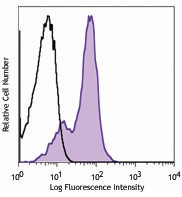
-

C57BL/6 mouse splenocytes were stained with H-2b (clone KH95) FITC (filled histogram) or mouse IgG2b, κ FITC isotype control (open histogram). -

BALB/C mouse splenocytes were stained with H-2b (clone KH95) FITC (filled histogram), or mouse IgG2b, κ FITC isotype control (open histogram).
| Cat # | Size | Price | Quantity Check Availability | ||
|---|---|---|---|---|---|
| 111505 | 50 µg | $93.00 | |||
| 111506 | 500 µg | $309.00 | |||
The KH95 antibody reacts with the H-2Db MHC class I alloantigen expressed on nucleated cells from mice of the H-2Db haplotype. H-2Db is involved in antigen presentation to T cells expressing CD3/TCR and CD8 proteins. Reactivity with other haplotypes (e.g., a,d,f,k,n,p,q,r,s,u,v) has not been reported.
Product Details
- Verified Reactivity
- Mouse
- Antibody Type
- Monoclonal
- Host Species
- Mouse
- Immunogen
- C57BL/10 mouse skin graft and splenocytes
- Formulation
- Phosphate-buffered solution, pH 7.2, containing 0.09% sodium azide.
- Preparation
- The antibody was purified by affinity chromatography, and conjugated with FITC under optimal conditions.
- Concentration
- 0.5 mg/ml
- Storage & Handling
- The antibody solution should be stored undiluted between 2°C and 8°C, and protected from prolonged exposure to light. Do not freeze.
- Application
-
FC - Quality tested
- Recommended Usage
-
Each lot of this antibody is quality control tested by immunofluorescent staining with flow cytometric analysis. For flow cytometric staining, the suggested use of this reagent is ≤ 1.0 µg per 106 cells in 100 µl volume. It is recommended that the reagent be titrated for optimal performance for each application.
- Excitation Laser
-
Blue Laser (488 nm)
- Application Notes
-
Additional reported applications (for the relevant formats) include: complement-dependent cytotoxicity1, and Western blotting.
-
Application References
(PubMed link indicates BioLegend citation) -
- Hasenkrug KJ, et al. 1987. Immunogenetics 25:136.
- Shao H, et al. 2005. J. Immunol. 175:1851.
- Ponomarev ED, et al. 2006. J. Immunol. 176:1402.
- Robb RJ, et al. 2012 Blood. 119:5898. PubMed
- Zhang P, et al. 2013. J. Immunol. 191:5291. PubMed
- Quinn KM, et al. 2013. J. Immunol. 191:5085. PubMed
- Markey KA, et al. 2014. J Immunol. 192:5426. PubMed
- Hogan T, et al. 2014. PLoS Comput Biol. 10:1003805. PubMed
- Product Citations
-
- RRID
-
AB_313511 (BioLegend Cat. No. 111505)
AB_313511 (BioLegend Cat. No. 111506)
Antigen Details
- Structure
- MHC class I
- Distribution
-
Nucleated cells of the H-2Db haplotype
- Function
- Antigen presentation
- Ligand/Receptor
- CD3/TCR, CD8
- Biology Area
- Immunology, Innate Immunity
- Molecular Family
- MHC Antigens
- Antigen References
-
1. Watts C. 1997. Ann. Rev. Immunol. 15:821.
2. Pamer E, et al. 1998. Ann. Rev. Immunol. 16:323.
3. York I, et al. 1996. Ann. Rev. Immunol. 14:369. - Gene ID
- 14964 View all products for this Gene ID
- UniProt
- View information about H-2Db on UniProt.org
Other Formats
View All H-2Db Reagents Request Custom Conjugation| Description | Clone | Applications |
|---|---|---|
| Biotin anti-mouse H-2D b | KH95 | FC |
| FITC anti-mouse H-2D b | KH95 | FC |
| PE anti-mouse H-2D b | KH95 | FC |
| Purified anti-mouse H-2D b | KH95 | FC |
| Alexa Fluor® 647 anti-mouse H-2D b | KH95 | FC |
| APC anti-mouse H-2D b | KH95 | FC |
| PE/Cyanine7 anti-mouse H-2D b | KH95 | FC |
| PerCP/Cyanine5.5 anti-mouse H-2Db | KH95 | FC |
| APC/Fire™ 750 anti-mouse H-2Db | KH95 | FC |
| PE/Dazzle™ 594 anti-mouse H-2Db | KH95 | FC |
Compare Data Across All Formats
This data display is provided for general comparisons between formats.
Your actual data may vary due to variations in samples, target cells, instruments and their settings, staining conditions, and other factors.
If you need assistance with selecting the best format contact our expert technical support team.
-
Biotin anti-mouse H-2D b

C57BL/6 (left) and BALB/c (right) mouse splenocytes were sta... -
FITC anti-mouse H-2D b
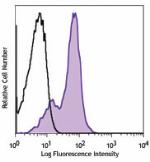
C57BL/6 mouse splenocytes were stained with H-2b ... 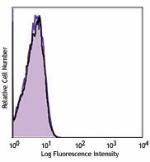
BALB/C mouse splenocytes were stained with H-2b (... -
PE anti-mouse H-2D b

C57BL/6 (left) and BALB/c (right) mouse splenocytes were sta... -
Purified anti-mouse H-2D b
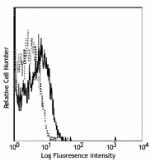
BALB/c splenocytes stained with KH95 PE 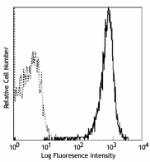
C57BL/6 splenocytes stained with KH95 PE -
Alexa Fluor® 647 anti-mouse H-2D b
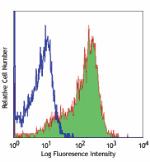
C57BL/6 mouse splenocytes stained with KH95 Alexa Fluor®... -
APC anti-mouse H-2D b
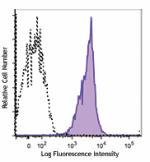
C57BL/6 mouse splenocytes were stained with H-2b ... -
PE/Cyanine7 anti-mouse H-2D b
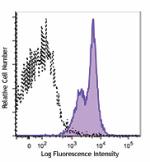
C57BL/6 mouse splenocytes were stained with H-2b ... -
PerCP/Cyanine5.5 anti-mouse H-2Db

C57BL/6 (left) and BALB/c (right) mouse splenocytes were sta... -
APC/Fire™ 750 anti-mouse H-2Db
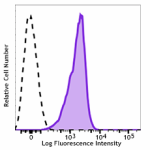
C57BL/6 mouse splenocytes were stained with H-2Db... 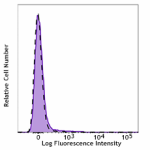
BALB/c mouse splenocytes were stained with H-2b (... -
PE/Dazzle™ 594 anti-mouse H-2Db
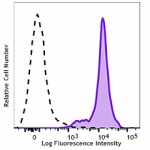
C57BL/6 mouse splenocytes were stained with H-2Db...
